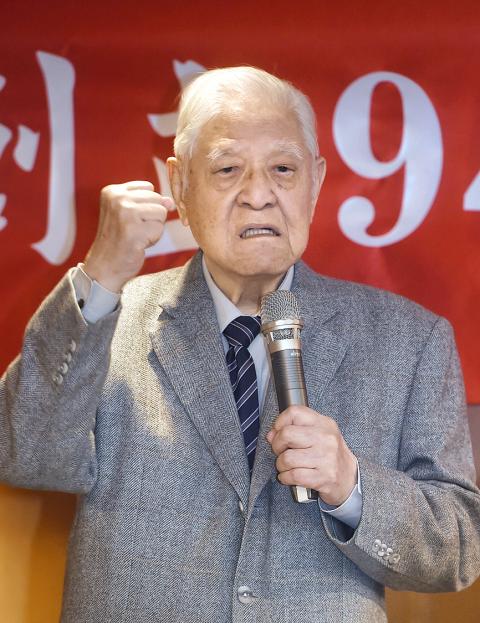Former president Lee Teng-hui (李登輝) yesterday followed up on his recent comments about President Tsai Ing-wen’s (蔡英文) cross-strait policy by reiterating his position on ending the “status quo” with China, saying that “Taiwanese understand that the nation has to walk its own path without fear.”
The statements came in the wake of his recent interview with Japan’s Sankei Shimbun, in which Lee attributed Tsai’s fall in popularity polls to her stance on maintaining the so-called “status quo” in relations with China, which Lee said is a deviation from popular sentiment.
“Taiwan is Taiwan, how can it maintain the ‘status quo’ with China? Taiwanese are opposed to that,” Lee said on the sidelines of an event in Taipei.

Photo: Fang Pin-chao, Taipei Times
Presidential adviser Koo Kwang-ming (辜寬敏), who also attended the event, said that 70 years ago there were only three independent nations in Asia and the rest were colonies, whereas today there are more than 20 sovereign nations in the region.
“Only Taiwan’s sovereignty is unclear,” Koo said.
If Tsai wants to talk about “maintaining the ‘status quo,’ then she should lay out a plan for the future,” Koo said, adding that failure to do so would be irresponsible.
As for his comments made in the same interview with the Sankei Shimbun, in which he said Tsai lacks courage and decisiveness, Lee said he was not criticizing her, but rather encouraging her to work harder.
Lee said that many problems remain unsolved, citing the lapses in Mega International Commercial Bank’s (兆豐銀行) internal management and controls exposed by the New York State Department of Financial Services’ announcement in August and a US$180 million fine of the bank’s New York branch for breaches of the US Bank Secrecy Act, pension reform disputes, labor disputes and the recent dissolution of TransAsia Airways Corp (復興航空).
Lee said problems such as those with TransAsia and Mega Bank are due to the handling of banking and financial matters by Chinese Nationalist Party (KMT) officials installed in their posts during the former administration, adding that Taiwan’s problems cannot be solved until these issues are dealt with.
In response to media queries on the Tsai administration’s performance over the past six months, Lee said the government is not handling the issues the public expects it to deal with, citing a drop in Tsai’s approval ratings from 50 percent to about 30 percent.
“[Tsai] must be careful in regard to the issues I just mentioned, otherwise her approval ratings will drop further. If she is not careful, she could end up like the South Korean President [Park Geun-hye],” Lee said.

CHAOS: Iranians took to the streets playing celebratory music after reports of Khamenei’s death on Saturday, while mourners also gathered in Tehran yesterday Iranian Supreme Leader Ayatollah Ali Khamenei was killed in a major attack on Iran launched by Israel and the US, throwing the future of the Islamic republic into doubt and raising the risk of regional instability. Iranian state television and the state-run IRNA news agency announced the 86-year-old’s death early yesterday. US President Donald Trump said it gave Iranians their “greatest chance” to “take back” their country. The announcements came after a joint US and Israeli aerial bombardment that targeted Iranian military and governmental sites. Trump said the “heavy and pinpoint bombing” would continue through the week or as long

TRUST: The KMT said it respected the US’ timing and considerations, and hoped it would continue to honor its commitments to helping Taiwan bolster its defenses and deterrence US President Donald Trump is delaying a multibillion-dollar arms sale to Taiwan to ensure his visit to Beijing is successful, a New York Times report said. The weapons sales package has stalled in the US Department of State, the report said, citing US officials it did not identify. The White House has told agencies not to push forward ahead of Trump’s meeting with Chinese President Xi Jinping (習近平), it said. The two last month held a phone call to discuss trade and geopolitical flashpoints ahead of the summit. Xi raised the Taiwan issue and urged the US to handle arms sales to

BIG SPENDERS: Foreign investors bought the most Taiwan equities since 2005, signaling confidence that an AI boom would continue to benefit chipmakers Taiwan Semiconductor Manufacturing Co’s (TSMC, 台積電) market capitalization swelled to US$2 trillion for the first time following a 4.25 percent rally in its American depositary receipts (ADR) overnight, putting the world’s biggest contract chipmaker sixth on the list of the world’s biggest companies by market capitalization, just behind Amazon.com Inc. The site CompaniesMarketcap.com ranked TSMC ahead of Saudi Aramco and Meta Platforms Inc. The Taiwanese company’s ADRs on Tuesday surged to US$385.75 on the New York Stock Exchange, as strong demand for artificial intelligence (AI) applications led to chip supply constraints and boost revenue growth to record-breaking levels. Each TSMC ADR represents

State-run CPC Corp, Taiwan (CPC, 台灣中油) yesterday said that it had confirmed on Saturday night with its liquefied natural gas (LNG) and crude oil suppliers that shipments are proceeding as scheduled and that domestic supplies remain unaffected. The CPC yesterday announced the gasoline and diesel prices will rise by NT$0.2 and NT$0.4 per liter, respectively, starting Monday, citing Middle East tensions and blizzards in the eastern United States. CPC also iterated it has been reducing the proportion of crude oil imports from the Middle East and diversifying its supply sources in the past few years in response to geopolitical risks, expanding